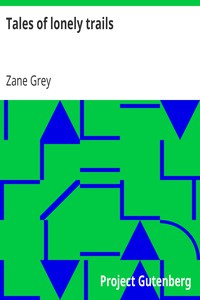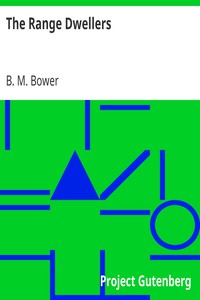Tales of lonely trails by Zane Grey (best affordable ebook reader .TXT) 📗

- Author: Zane Grey
Book online «Tales of lonely trails by Zane Grey (best affordable ebook reader .TXT) 📗». Author Zane Grey
My turn with the glasses revealed to me that what I had imagined to be a cub was indeed a big bear. After Nielsen looked he said: "Never saw one so big in Norway."
"Well, look at that black scoundrel!" exclaimed R.C. "Standing up! Looking around! Wagging his head!... Say, you saw him first. Suppose you take some pegs at him."
"Wish Romer were here. I'd let him shoot at that bear," I replied. Then I got down on my knee, and aiming as closely as possible I fired. The report rang out in the stillness, making hollow echoes. We heard the bullet pat somewhere. So did the bear hear it. Curiously he looked around, as if something had struck near him. But scared he certainly was not. Then I shot four times in quick succession.
"Well, I'll be darned!" ejaculated R.C. "He heard the bullets hit and wonders what the dickens.... Say, now he hears the reports! Look at him stand!"
"Boys, smoke him up," I said, after the manner of Haught's vernacular. So while I reloaded R.C. and Nielsen began to shoot. We had more fun out of it than the bear. Evidently he located us. Then he began to run, choosing the open slope by which he had come. I got five more shots at him as he crossed this space, and the last bullet puffed up dust under him, making him take a header down the slope into the thicket. Whereupon we all had a good laugh. Nielsen appeared particularly pleased over his first shots at a real live bear.
"Say, why didn't you think to ride round there?" queried R.C. thoughtfully. "He didn't see us. He wasn't scared. In a few minutes you could have been on the rim of that slope right over him. Got him sure!"
"R.C. why didn't you think to tell me to do that?" I retorted. "Why don't we ever think the right thing before it is too late?"
"That's our last chance this year—I feel it in my bones," declared R.C. mournfully.
His premonition turned out to be correct. Upon our arrival at camp we heard some very disquieting news. A neighbor of Haught's had taken the trouble to ride up to inform us about the epidemic of influenza. The strange disease was all over the country, in the cities, the villages, the cow-camps, the mines—everywhere. At first I thought Haught's informant was exaggerating a mere rumor. But when he told of the Indians dying on the reservations, and that in Flagstaff eighty people had succumbed in a few weeks—then I was thoroughly alarmed. Imperative was it indeed for me to make a decision at once. I made it instantly. We would break camp. So I told the men. Doyle was relieved and glad. He wanted to get home to his family. The Haughts, naturally, were sorry. My decision once arrived at, the next thing was to consider which way to travel. The long ten-day trip down into the basin, round by Payson, and up on the rim again, and so on to Flagstaff was not to be considered at all. The roads by way of Winslow and Holbrook were long and bad. Doyle wanted to attempt the old army road along the rim made by General Crook when he moved the captured Apaches to the reservation assigned to them. No travel over this road for many years! Haught looked dubious, but finally said we could chop our way through thickets, and haul the wagon empty up bad hills. The matter of decision was left to me. Decisions of such nature were not easy to make. The responsibility was great, but as the hunt had been for me it seemed incumbent upon me to accept responsibility. What made me hesitate at all was the fact that I had ridden five miles or more along the old Crook road. I remembered. I told Lee and I told Nielsen that we would find it tough going. Lee laughed like a cowboy: "We'll go a-hummin'," he said. Nielsen shrugged his brawny shoulders. What were obstacles to this man of the desert? I realized that his look had decided me.
"All right, men, we'll try the old Crook road," I said. "Pack what you can up to the wagon to-day, and to-morrow early we'll break camp."
I walked with the Haughts from our camp across the brook to theirs, where we sat down in the warm sunshine. I made light of this hunting trip in which it had turned out I had no gun, no horse, no blankets, no rain-proof tent, no adequate amount of food supplies, and no good luck, except the wonderful good luck of being well, of seeing a magnificent country, of meeting some more fine westerners. But the Haughts appeared a little slow to grasp, or at least to credit my philosophy. We were just beginning to get acquainted. Their regret was that they had been unable to see me get a bear, a deer, a lion, and some turkeys. Their conviction, perhaps formed from association with many sportsman hunters, was that owing to my bad luck I could not and would not want to come again.
"See here, Haught," I said. "I've had a fine time. Now forget about this hunt. It's past. We'll plan another. Will you save next fall for me?"
"I shore will," he replied.
"Very well, then, it's settled. Say by August you and the boys cut a trail or two in and out of Horton Thicket. I'll send you money in advance to pay for this work, and get new hounds and outfit. I'll leave Flagstaff on September fifteenth. Meet you here September twenty-first, along about noon."
We shook hands upon the deal. It pleased me that the Haughts laughed at me yet appeared both surprised and happy. As I left I heard Edd remark: "Not a kick!... Meet him next year at noon! What do you know about thet?" This remark proved that he had paid me a compliment in eastern slang most likely assimilated from R.C. and Romer.
The rest of the afternoon our camp resembled a beehive, and next morning it was more like a bedlam. The horses were fresh, spirited, and they had tender backs; the burros stampeded because of some surreptitious trick of Romer's. But by noon we had all the outfit packed in the wagon. Considering the amount of stuff, and the long, rough climb up to the wagon, this was a most auspicious start. I hoped that it augured well for us, but while I hoped I had a gloomy foreboding. We bade good-bye to Haught and his son George. Edd offered to go with us as far as he knew the country, which distance was not many miles. So we set out upon our doubtful journey, our saddle-horses in front of the lumbering wagon.
We had five miles of fairly level road through open forest along the rim, and then we struck such a rocky jumble of downhill grade that the bundles fell off the wagon. They had to be tied on. When we came to a long slow slant uphill, a road of loose rocks, we made about one mile an hour. This slow travel worked havoc upon my mind. I wanted to hurry. I wanted to get out of the wilds. That awful rumor about influenza occupied my mind and struck cold fear into my heart. What of my family? No making the best of this! Slowly we toiled on. Sunset overtook us at a rocky ledge which had to be surmounted. With lassos on saddle horses in front of the two teams, all pulling hard, we overcame that obstacle. But at the next little hill, which we encountered about twilight, one of the team horses balked. Urging him, whipping him, served no purpose; and it had bad effect upon the other horses. Darkness was upon us with the camp-site Edd knew of still miles to the fore. No grass, no water for the horses! But we had to camp there. All hands set to work. It really was fun—it should have been fine for me—but my gloomy obsession to hurry obscured my mind. I marveled at old Doyle, over seventy, after that long, hard day, quickly and efficiently cooking a good hot supper. Romer had enjoyed the day. He said he was tired, but would like to stay up beside the mighty camp-fire Nielsen built. I had neither energy or spirit to oppose him. The night was dark and cold and windy; the fire felt so good that I almost went asleep beside it. We had no time to put up tents. I made our bed, crawled into it, stretched out with infinite relief; and the last thing I was aware of was Romer snuggling in beside me.
Morning brought an early bestirring of every one. We had to stir to get warm. The air nipped like cold pincers. All the horses were gone; we could not hear a bell. But Lee did not appear worried. I groaned in spirit. More delay! Gloom assailed me. Lee sallied out with his yellow dog Pups. I had forgotten the good quality of Pups, but not my dislike for him. He barked vociferously, and that annoyed me. R.C. and I helped Edd and Nielsen pack the wagon. We worked quick and hard. Then Doyle called us to breakfast. We had scarcely started to eat when we heard a jangle of bells and the pound of hoofs. I could not believe my ears. Our horses were lost. Nevertheless suddenly they appeared, driven by Lee riding bareback, and Pups barking his head off. We all jumped up with ropes and nose-bags to head off the horses, and soon had them secured. Not one missing! I asked Lee how in the world he had found that wild bunch in less than an hour. Lee laughed. "Pups. He rounded them up in no time."
Then I wanted to go away and hide behind a thicket and kick myself, but what I actually did was to give Pups part of my meat. I reproached myself for my injustice to him. How often had I been deceived in the surface appearance of people and things and dogs! Most of our judgments are wrong. We do not see clearly.
By nine o'clock we were meeting our first obstacle—the little hill at which the sorrel horse had balked. Lo! rested and full of grain, he balked again! He ruined our start. He spoiled the teams. Lee had more patience than I would have had. He unhitched the lead team and in place of the sorrel put a saddle horse called Pacer. Then Doyle tried again and surmounted the hill. Our saddle horses slowly worked ahead over as rocky and rough a road as I ever traveled. Most of the time we could see over the rim down





Comments (0)